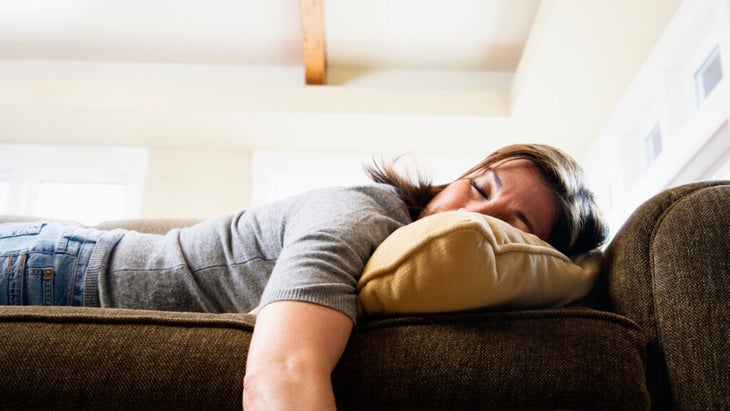No products in the cart.
Outdoor Adventure
Post-Run Naps Are the Best, But Are They Good for Us?
The post-long run nap—some athletes love it, need it, and swear by it. Others complain it’s a necessary evil, that they actually feel worse after passing out on the couch. So which is it? Is an after-workout snooze optimal for recovery? Or is it only hindering your sleep schedule later in the evening?
We caught up with a few experts to gain clarity on the topic.
The Cause of Post-Run Sleepiness
This might feel like a “duh” moment, but there’s a lot of science behind why your muscles and overall psyche become tired after a long run. When you work out, your muscles are using adenosine triphosphate (ATP), a compound in the body used as a source of energy, to contract and flex. When you deplete ATP levels, your muscles don’t have enough of it to efficiently work and move, therefore bringing about something called “peripheral fatigue.” This is a type of exhaustion that occurs due to changes in the muscles themselves.
A second type of tiredness you might feel after a long run is “central fatigue,” which occurs when overexertion changes the brain’s chemical balance. This slows the communication between the central nervous system and muscles, making you not only mentally exhausted, but inhibits your ability to transmit messages to your legs.
There’s also research that points to the idea that feeling tired after exercising is the body’s way of protecting itself from burnout and injury. But further studies need to be conducted to prove that undoubtedly.
What the Experts Say
Tag along with marathon champion Hellen Obiri for 24 hours and you’ll find that this Boston Marathon winner and Olympian takes several mandatory naps a day, mostly after her training sessions. But longtime running coach, Katie O’Connor, says post-run nap opportunities aren’t prescribed often for her clients. Most of them are parents or people with hectic work schedules, so taking a couch siesta isn’t exactly realistic, though they wish it was.
“In my opinion, I think it just messes with your sleep schedule later on,” O’Connor says. “So many people don’t get enough sleep at night as it is. The better rested you are before your long run, the less chance you’ll need to have that post-run crash.”
She adds that if someone has a peak run of 20 miles or more, or is exercising through extreme cold or hot weather, a nap might be necessary. After a big race, for example, O’Connor is all for athletes sleeping as much as they can. But otherwise, she feels no one should feel so exhausted that they feel the need to crash. “There are other ways to recover than a nap—compression boots, cold or hot soaks, getting in a protein smoothie,” O’Connor says.
Clinical psychologist Shelby Harris not only specializes in behavioral sleep medicine, but she is a marathon runner herself. When asked if she participated in the ceremonial post-run nap, she says, “I used to [nap] when I was a newer runner and had a long run of more than two hours. Now I’m more conditioned to it that I don’t feel the need to.”

However, she’s not against taking a siesta after an afternoon out on the trails, confirming that a post-run nap can be a useful way for your body to recover and repair muscles, as well as boost energy.
Sleep specialist Chris Winter, host of the Sleep Unplugged podcast, is more focused on differentiating between feeling sleepy and feeling fatigued. For example, he can’t ever remember a time where he worked with a marathon runner who couldn’t keep their eyes open at mile 18 because they were so tired.
“Another question is to ask yourself: Why do I feel the need to sleep after a run versus just resting?” Winter says. “Lack of hydration, overtraining, age, illness—there are a lot of things that can impact the fatigue severity scale.”
Sure, there’s a certain amount of exhaustion that’s expected after a tough workout, but sleep experts like Winter watch out for red flags like excessive lethargy, which can hinder an athlete’s performance. That’s when it’s important to look into potential chronic illness, nutritional deficiencies, depression, or something else.
Pros of the Post-Run Nap
Muscle recovery: Sleep triggers the release of growth hormones, which are essential in stimulating protein synthesis, a process in which proteins are used to repair the tiny tears in muscles that accumulate during exercise.
Replenish glycogen: One of the best ways to restore glycogen is by eating enough carbs after exercising, but it’s also replenished during sleep. The body constantly and naturally produces glycogen (as long as you’re properly fueled), so when you’re asleep and not expending energy, it has time to catch up on what it’s lost during the day.
Increased mental alertness: This one seems obvious, but while you sleep, your body both mentally and physically recharges by repairing muscle and tissue, strengthening memory consolidation, removing toxins from the brain (thanks to the glymphatic system), and more.
Cons of the Post-Run Nap

Grogginess: Sometimes you feel less rested after your nap, and that’s due to something called “sleep inertia,” the transitional period from sleep to waking up. The brain produces delta waves while you’re sleeping, and when you wake up abruptly from a nap, it might not have time to stop sending those waves. This leads to grogginess, sleepiness, and confusion.
Disrupted sleep schedule: Napping can be a vicious cycle. You nap because you’re tired, but then you’re not tired later so you don’t sleep very well overnight. The next morning, you’re tired again, so you nap again, and the cycle continues. If you’re prone to insomnia, you might want to avoid naps for this reason.
Poor nap quality: Studies show that the benefits of sleep are most noticeable when you are in a deep sleep, which isn’t always the case with a post-run nap. More likely than not, you’re crashing on a couch (which is usually less comfortable than a bed), and your core temperature and heart rate are high, making it difficult to relax into sleep.
To Snooze or Not to Snooze?
The answer to whether or not you’ll want to partake in post-run shuteye is highly personal, but most sleep experts advise following a few nap guidelines:
- Keep it consistent. Nap everyday at the same time for the same amount of time so your body becomes accustomed to it. This will reduce sleep inertia.
- Don’t let it become a domino effect. If you sleep during the day, you’ll most likely go to bed later than usual. This can often cause people to want to sleep late the next day, disrupting their whole schedule. No matter what, keep your morning wake-up time the same.
- Hydrate and refuel beforehand. Don’t crash without first getting sufficient electrolytes, carbs, and protein. You may even find that you don’t feel so exhausted after drinking and eating.
Here’s the bottom line: With great naps come great responsibility. You don’t necessarily need to fight sleep after a long run, but be smart about it. If you finish up late in the afternoon, it might not make a ton of sense to take a nap since you’re so close to bedtime. In that case, you can grab a cup of coffee or take a cold plunge to stay awake. But in another scenario, where you have the afternoon to spend at your leisure, a 20-minute nap isn’t a big deal. Most importantly, if you feel like your exhaustion is out of control, seek out medical advice. Don’t sleep on taking care of your Zzzzs!
Source link

